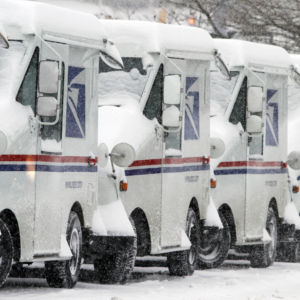In life, only three things can be certain: death, taxes, and job security at the United States Postal Service (USPS). But, unless the beleaguered agency keeps its labor costs under control, taxes and stamp prices will probably have to be increased to pay for Postal “lifers.”
With another lopsided deal with a major employee union, the USPS has signaled to taxpayers and consumers that it has little interest reining in expenses. The agency will run out of cash by 2024, absent significant reforms and better deals made by leadership. Millions of mail consumers deserve better than a Postal Service that values excuses and passing the buck over much-needed comprehensive reforms.
Ask the USPS and they’ll tell you that they’re doing the best that they can. Don’t believe them. In fiscal year (FY) 2019, controllable costs (e.g. costs within the control and discretion of the agency) surged to $3.4 billion, a significant increase from 2018’s total of $1.9 billion. Any organization with that much bloat needs to go on a diet immediately, and not just the “no sweets after 10:00 pm” variety.
Thanks to ludicrous agreements with unions such as the National Postal Mail Handlers Union (NPMHU) and the American Postal Workers Union (APWU), labor costs comprise more than three-quarters of total agency expenses. These organizations hold plenty of power, with the full knowledge that, according to federal law, impasses between unions and the USPS will automatically force the hand of the agency in binding mediation.
It doesn’t help that these labor organizations see every small USPS reform as a sinister conspiracy to privatize mail operations. When USPS and Staples kicked off a pilot program in 2013 to provide postal services at hundreds of the retailer’s locations, the APWU cried foul and launched protests and legal actions against the agency. The promising partnership, which lowered costs for the USPS and expanded options for consumers, was finally killed by a 2016 National Labor Relations Board ruling instigated by the powerful union.
USPS labor leadership has also turned its sights toward another “pressing” threat: non-career, lower-compensated workers that the USPS can flexibly reassign or terminate. The USPS has made impressive progress over the past decade in hiring fewer new, standard-track employees that are handsomely-compensated and all-but-impossible to fire and instead going the route of non-standard “casual” hires.
According to a 2019 Inspector General report, “Over the last 10 years, the Postal Service has reduced the total number of employees by 11 percent …While reducing career employees by 20 percent, it increased the number of non-career employees by 54 percent.” But the APWU has lambasted this trend, decrying the “undercutting our long-standing protections against layoffs” and allegedly killing the “opportunity for our family members and coming generations to obtain good paying union postal jobs.”
A recent agreement with the mail handlers’ union assures that these economical employees will be all-but-shut-out of key parts of the postal workforce. A recently-inked agreement with the NPMHU forbids “casuals” from the Mail Handler craft, which entails loading, dumping, and preparing mail for delivery. This is even harsher than a 2016 agreement between the union and USPS, which capped the number of casuals in the craft at 3 percent. And as usual, the agreement shields career employees from layoffs and force reductions, even if the USPS deems it necessary to stem its unsustainable financial situation.
USPS leadership deserves much of the blame for bowing to unions without defending the agency’s right to hire workers without gold-plated benefits. But, Congress also must reassess current law, which allows Postal unions to collectively bargain as widely as private-sector unions without the job instability and uncertainty that faces most private-sector employees.
Organizations such as the APWU and NPMHU can agitate for higher wages and excluding other workers without having to worry about layoffs or their “company” going out of business. If unions want a continued reprieve of the risks of the private sector, they should be confined to the more limited collective-bargaining freedoms of the public sector. Without reforming union law, Congress and USPS leadership will continue the agency’s free-fall toward insolvency and taxpayer bailouts. Unless something changes, taxpayers and consumers can be certain of higher taxes and stamp prices.

